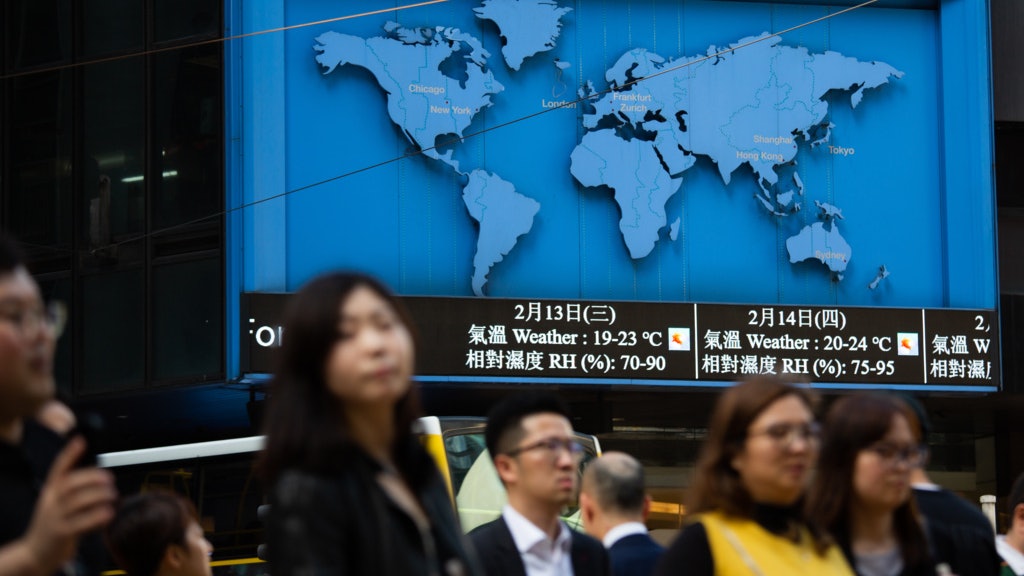weekly
Written by: Hao Yang Yang
2019-12-05 17:11
Last updated: 2019-12-05 17:16Because of fear, Hong Kong ’s first-generation middle class has left. Thirty years later, Hong Kong ’s “second-generation” has also left. But it ’s gone, it ’s not going to be solved because someone ’s gone. What ’s wrong with the middle class? What's wrong with reflecting the social structure?
Time has changed, and when the "first-generation middle class" has quickly entered the retirement age, the "second-generation middle class" has also begun to enter the society. Mr. Chen, who stepped out to meet reporters at a gym in a housing estate in Jiulongtang District, was one of them.
Carry out the above: [Middle class. I] Changes in the status of the middle class from the perspective of the rising new generation
Monthly income of 50,000 "second-generation middle class"
Mr. Chen's grandparents were working class, his grandfather was a taxi driver, and his grandfather was a chef. By the 1980s, his parents had the opportunity to study in Hong Kong for a junior college. After graduation, they had to help his family to complete the master ’s degree with Niu Chenglun. Ninety After returning to Hong Kong in the 1950s, he joined the vigorous market promotion and human resources industries and became the "first-generation middle class." Mr. Chen, who grew up in this environment, went to directly funded elementary school and advanced to directly funded middle school. When choosing a university, he was not influenced by his parents like Miss Zhang. Instead, he was at the "Big Three" (Hong Kong University, The Chinese University of Hong Kong) as he pleased. , Hong Kong University of Science and Technology).
After graduating last year, Mr. Chen received admission notices from apprentice executives at several banks, but in the end he went to a management consulting company with less than half the salary, because the bank did n’t go to work until June. He thought of the management consulting company "try and play I do n’t like to "snap away at any time" and then resign to work at the bank. But in the summer, he still stayed at the company because he had no interest in bank work. "But it's a lot of fun here, I mean consulting. This is interest." However, "interest" ultimately defeated "ideal". He recently joined The government has become a senior civil servant with monthly income of more than 50,000 yuan. With reference to the median monthly income of male employed persons aged 20 to 29 in 2018, Mr. Chen is more than twice as high as the equivalent age of 15,500 yuan and has more 34,000 yuan for a post-secondary education degree is more than half.
Mr. Chen said that he has always had a lot of opinions about the society. The reason why he switched to the government was not because of high salaries, good jobs or stable prospects, but because he wanted to give it a try in this "trend". (Profile picture / Photo by Lu Yiming)
Mr. Chen said that he has always had a lot of opinions about the society. The reason why he switched to the government is not because of high salaries, good jobs or stable prospects, but because he wants to try it in this "temporary situation." "Although I don't know what to do, but see See what can be done in the (government), or look at everything from another angle. Know more about things you can't see outside. "Of course, the old company promised that he could return to the nest at any time, and also created for his departure. Great incentive. They are both civil servants, but different from Miss Zhang, when the reporter asked Mr. Chen what class he belonged to, he did not claim to be a "middle class", but said that he was a "newcomer in society", and described the class's population as "somewhat promising" It's vague, I don't know if what I'm doing or what I really want to do. "
He is not satisfied with his current job in the government and feels "interesting." He also described himself as a secretary, and even thought that if he was transferred after two years but the situation remained, he would leave. Obviously, Mr. Chen is not attracted by "stability" like Miss Zhang, except that there is no family burden. The main reason is that he does not want to tie his future to Hong Kong, especially he does not want the next generation to grow up in this city. "I have a (UK) passport and my family wants to leave. You do n’t know what will happen after 2047. Seriously, although my boss often says," I do n’t understand why I worry about one country, two systems disappearing, "what, but I do n’t think so. They don't think they will "fuck" you well after 2047, but it's already done like this before 2047. "
How did it happen? And who made this up?
The main reason why the middle class does not want to take root in the present Hong Kong is that they prejudge "2047"-they believe that the current people's livelihood and political problems are difficult to solve, and Hong Kong will only get worse in the future. (Profile picture)
Accumulation of social problems has no confidence in the government
"I will worry about my son growing up in this environment, more than the" 2047 "node (incident), not a single node, the whole society is not human. You think about the current property prices, reading atmosphere, the whole society preached It ’s not a place where normal people should live. ”Mr. Chen ’s family seems to have implemented immigration very thoroughly. His parents have already sold another non-self-occupied property, and his brother is planning to go to England for further studies. He may be the only one who will stay there. Working in Hong Kong.
A similar statement has been heard from Miss Zhang ’s mouth: "Because of this situation, I'm" stable. "Because I might have thought of having children before, but now that the society is too complicated, I do n’t want to have children. I may not be able to nurture him when I have children. Give him a good environment. If I want to give birth, I will emigrate first, so that he has a better environment ... Hong Kong is not as safe and suitable for living as before, it seems like a lot of pressure, there are many things to compare and competition. Not suitable for children An environment of growth and happiness. "
The housing problem is also a source of concern for Miss Zhang. She had planned to buy a home, and even planned to live in the next 20 years. "But this time may not necessarily be bought in Hong Kong. The burden is easy, because I no longer consider buying a house. Even if I want to buy, I may go to Thailand or Taiwan. Buy more than you plan to buy in Hong Kong. Invest or prepare for future opportunities to immigrate. "
The anxiety of Miss Zhang and Mr. Chen more or less reflected the anxiety of the new middle class. They did not even want to take root in the present Hong Kong, and the main reason was their prejudgment of "2047"-the current livelihood and political issues It is difficult to solve, and Hong Kong will only get worse in the future. Mr. Chen said that "2047" is not a single node; in other words, they see the social problems that have been accumulated, and these problems have become highly politicized from time to time because of ideological disputes, as Miss Zhang said, "Before these months, I think Hong Kong is ok. " Mr. Chen also said, "2047 has always been worried, but it was not until one or two years that I really planned to leave. Now this government is so" epileptic "and the police is so" epileptic ", it is really" fuck ". He may not be pure Seeing social issues from a politicized perspective, but its argument is not unreasonable-it may be precisely because the authorities are too bureaucratic, do not think carefully about the political meaning behind social policies, and do not have a comprehensive thinking of structural reforms, so that they can plant the root of the calamity. Until the public outcry through political controversy, citizens naturally became less and less confident about the government.
The housing problem is a source of anxiety for many emerging middle class. (Profile picture / Photo by Huang Yongjun)
"Immigration" is not unique to the newly-increased middle class, such as Ms. Zhang or Mr. Chen. Under the storm of anti-revision legislation, Hong Kong has also set off an "immigrant" fever. The Hong Kong Institute of Asia-Pacific Studies of the Chinese University of Hong Kong recently released an "immigrant" poll. 42% of the respondents claimed to have thoughts of immigration or emigration. Nearly one adult had already prepared them. Both of these figures were nearly three years old. New high. The survey results also show that the top four “local factors” that are intended to immigrate are “too much political dispute / too annoyance / social tearing in Hong Kong” (27.9%), “political undemocracy in Hong Kong” (21.5%), "Dissatisfied with the central government / central government dictatorship / no confidence in the central government" (19.5%), and "crowded living environment in Hong Kong" (19.1%); and "destination factor" is "relative living environment" (28.8% ), "A better freedom / human rights situation" (21.0%), "Good air / less pollution / quietness" (15.3%), and "Political system is more democratic" (13.5%). To put it simply, most people are planning to leave Hong Kong because of politics and living environment. Compared with the polls in the previous three years, political factors have become the three main reasons for the first time.
No one needs structural reforms
According to the police, since June, applications for no criminal record certificates have increased significantly from last year: 3,049 applications in July, an increase of 41% year-on-year; 3,649 applications in August, an increase of 54% year-on-year; 9 There were 3,597 applications in the month, more than double the same period last year. This "Good People's Identity Card" is one of the first conditions for immigrants. Since Hong Kong residents do not need to declare the purpose of departure to the government, the Security Bureau can only evaluate the number of foreign immigrants in Hong Kong based on the number of "Good People's Identity Cards" applications. In the past decade, the number has hovered between 6,500 and 8,300. The last time it was estimated that more than 10,000 immigrants left Hong Kong in 2006. The United States, Canada, and Australia are Hong Kong's favorite immigration destinations. In recent years, Taiwan has also become a hot spot, with about 1,000 applications each year.
As the authorities do not have the exact number of immigrants, we have no way of knowing the background information or class status of the immigrants. However, immigration through normal and legal channels has never been the choice of the general grassroots. Taking Taiwan with relatively loose immigration conditions as an example, immigrant applicants need to invest more than NT $ 6 million in Taiwan before they can stay legally and then sit for another year. "Immigration Bureau". What is the concept of this immigration condition? 6 million Taiwan dollars is equivalent to 1.5 million Hong Kong dollars, which is enough for the first phase of buying a home. Therefore, immigration is not only a matter of population migration, it is also a matter of class-only those who have sufficient economic capital (investment immigration) or cultural capital (education immigration, professional immigration) can "go to the ideal place."
Bottlenecks have emerged within the middle class, and the previous generation is concerned that the next generation will fail to renew its socioeconomic status. (Profile picture / Photo by Lin Ruoqin)
Those who are capable can leave, and those who are incapable will stay to bear the political problems, education problems, housing problems that the middle class talks about. This statement is cruel, as if the grassroots should have to bear more social problems, but the reality is that the middle-class elites who are expected to lead Hong Kong to democratization and social reform, when they climb up through this social structure, they It seems that people have forgotten the sufferings of the people, instead they are committed to maintaining this distorted social order, and in the face of distress, their first choice is to leave.
The growth rate of the middle class has slowed down, and the internal competition in the middle class has intensified. Even if it is 30,000 yuan a month at a young age, its promotion space is much narrower than ten years ago. Not many people can foresee that they can squeeze into the monthly ten 10,000, 80,000 ranks. At the same time, in the absence of new economic growth, the job market simply failed to better absorb highly educated people, which led to the devaluation of degrees and the loss of "master" or "doctoral degrees". The bottleneck has already appeared in the middle class. The previous generation was worried that the next generation would not continue its socio-economic status. The next generation of the middle class did not intend to reverse the structural difficulties. Instead, it planned to leave Hong Kong and find a new world.
When structural problems are not properly resolved, the anxiety of the middle class will be revealed elsewhere. This may be extreme right-wing xenophobia or class contradictions, and it may also cause people to be distracted. Speaking of concerns about the future, Mr. Chen said that "worries are meaningless" because his concerns cannot be resolved. In other words, even the middle class and the elite who succeeded in this game did not believe it.
What the middle class or the grassroots need is not a one-time tax rebate measure, but a drastic redistribution of wealth. Even if sugar is distributed, it should be structural sugar. (Profile picture)
If we want to talk about a reasonable solution, we might ask what class politics Hong Kong should practice and how to ensure that different industries can create a relatively even middle-class treatment. In the final analysis, the "Hong Kong experience" and "middle-class dream" need to be rewritten because we can no longer take it for granted that only a large class of middle class can be created by economic development, and major social policies such as housing and education cannot Taking the middle class as the biggest beneficiary, all classes should benefit equally. Take the housing problem as an example, almost everyone is going to get on the bus because Hong Kong does not have any confidence-worthy investment, and there is not enough protection for work or retirement. What the middle class or the grassroots need is not a one-time tax rebate and rescue measures, but a drastic redistribution of wealth. Even if sugar is distributed, it should be structural sugar! 
The above excerpt is from the "Worried New Middle Class" in the 191th issue of "Hong Kong 01" Weekly (December 2, 2019).
More weekly articles: [01 weekly report page]
"Hong Kong 01" Weekly is available at major newsstands, OK convenience stores and Vango convenience stores. You can also subscribe to the weekly newsletter here to read more in-depth reports.
01Weekly Report on Hong Kong Immigrants







